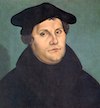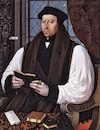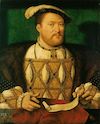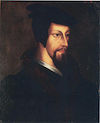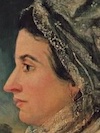Martin Luther is Born
Martin Luther was born in 1483 in Eisleben in the Electorate of Saxony.
William Tyndale is Born
Tyndale produced a major English translation of the Bible which helped form part of the basis for the King James Version.
Thomas Cramner is Born
The future principle author of the Book of Common Prayer and Book of Homilies is born in Nottinghamshire, England.
John Calvin is Born
John Calvin is born in Noyon in the region of Picardy in the Kingdom of France.
German Peasant's War
Large areas around central Europe began to revolt against their magistrates. The Bauernkrieg, or Peasants’ War, was quickly crushed by the princes to Luther’s surprising delight.
Martin Luther dies
Luther dies of natural causes in the same city of his birth, Eisleben.
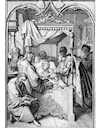
First Edition of the Book of Common Prayer
Bishop Cramner publishes the first BCP during the reign of King Edward VI. Though he was young and his reign was brief, Edward was influential in this early period of the autonomous English Church.
Richard Hooker is Born
Hooker was born during the brief reign of Queen Mary but grew up during the reign of Queen Elizabeth.
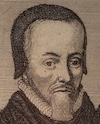
Johann Arndt is Born
Arndt, one of the founders of German Pietism and author of True Christianity, is born near Ballenstedt in Anhalt.
Jacob Armnius Born
Jacob Armnius was born in Oudewater at the beginning of the conflict between the United Provinces and the Spanish Hapsburgs.
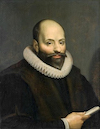
The End of the Council of Trent
TThe 19th ecumenical council of the Catholic Church lasted for 18 years and attempted to respond to the rise of Protestantism.
Calvin dies.
Theodore Beza takes over authority in Geneva and becomes the central figure of the second generation of Reformed theology in Continental Europe.
Hooker publishes The Lawes...
The Laws of Ecclesiastical Polity are first published developing a robust and unique Anglican theology.
Arminius appointed to Leiden
Jacob Arminius is appointed to the University of Leiden which eventually led to charged brought against his theological writings.
Hampton Court Conference
King James I calls a conference as the new King and a new English translation is proposed.
Jeremy Taylor is born
The English pastor and author of Holy Living and Holy Dying is born in Cambridge.
Synod of Dort begins
A national church council for the United Provinces begins to unite the country and clarify a theological response to Arminianism.
Samuel Annesley is born
The father of Susanna and grandfather of John Wesley is born in Warwickshire, England.
Charles I Crowned King
King Charles I takes the thrown at a delicate time in the history of England.
William Laud becomes Archbishop of Cantebury
King Charles I replaces the Reformed George Abbot with the high church, William Laud.
Philipp Spener is Born
Spener, the central figure in German Pietism and author of the Pia desideria, is born in Upper Alsace.
Edward Stillingfleet is Born
Stillingfleet was a pastor and theologian influential on Wesley's view of the ancient church.
John Westley is born.
The grandfather of John and Charles is born in Dorsetshire. The spelling of his family name changed from time to time.
The Bishops' War
Scotland rebels against England because of a new Scottish prayerbook produced by William Laud
Anthony Horneck is born
The German pastor who would later help start English societies is born in Bacharach.
English Civil War
Charles attempts to arrest five members of parliament instagating the first English Civil War.
Battle of Naseby
The resounding victory of Thomas Fairfax at Naseby crushed the Royalists and ended the first part of the Civil War.
Westminster Catechism
The Westminster Assembly publishes the Westminster Catechism in the midst of Civil War.
King Charles Executed
A rump of the Long Parliament convicted Charled of treason and executed him, thus ending the monarchy for a time.
Oliver Cromwell named Lord Protector
The calvary General, Cromwell, consolidated power and helped form a new constitution for the English. He also defeated the Dutch.
Cromwell Dies
The death of Oliver Cromwell led to the return of the Stuarts and the crowning of King Charles II.
New Prayerbook Published
Charles II publishes an updated Book of Common Prayer that will be in print during the life of John Wesley.
Samuel Wesley is born.
Samuel is born in Dorset.
August Hermann Francke is born.
Francke is born in Lüblin and will become an influential figure in the group known as the Moravians.
William Law is born
Law, the theologian and spiritual writer, is born in King's Cliffe.
Susanna and Samuel Wesley are married
Their marriage takes place after Samuel's time at Oxford and before his ordination.
Samuel Wesley sent to South Ormsby
Samuel receives his first real appointment as a pastor and the family moves from London to Lincolnshire.
The Glorious Revolution
William of Orange invades England; is declared king. Act of Toleration is passed that allows freedom of worship for nonconformists.
Samuel Wesley sent to Epworth
Samuel receives the appointment to Epworth where he will serve until his death in 1735.
Zinzendorff is born.
Nikolaus Ludwig, Reichsgraf von Zinzendorf und Pottendorf is born in Dresdon to one of the most prominent families in the area.
Queen Anne is Crowned
Anne becomes Queen after the death of her brother-in-law, William of Orange.
John Wesley is born
Wesley is born on June 17, 1703, in Epworth.
The Epworth Fire
A fire breaks out in the parsonage at Epworth and burns the structure down, almost killing young John Wesley.
John Wesley goes to Charterhouse
John leaves home for the first time to head to the Charterhouse School in London.
King George I is crowned
The Hanoverian prince becomes king of England because of his Protestant faith.
Charles Wesley goes to Westminster
Charles Wesley follows older brother, Samuel, to the Westminster School.
John Wesley enters Christ Church, Oxfordr
John Wesley arrives in Oxford following the tradition of his father and brother.
John Wesley is ordained a deacon
In January, John decides to become a priest and he is ordained a deacon in September of 1725.
King George II is Crowned
The Hanoverian dynasty continues with George II.
John Wesley returns to Oxford
John leaves Wroot and returns to take up his position at Lincoln College again. He begins to meet regularly with other students in what will become the Holy Club.
Oglethorpe goes to Georgia
James Oglethorpe and the first Georgia Colonists arrive in Savannah early in 1733.
John and Charles go to Georgia
John and Charles move to Georgia. On the way, they meet a group of Moravians and have a powerful spiritual experience.
The Trial of John Wesley
John Wesley is put on trial in Georgia for defamation against Sophy Williamson and other charges.
